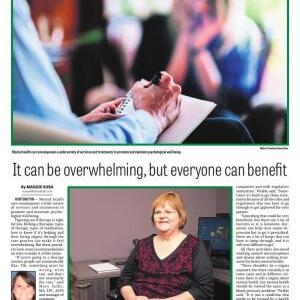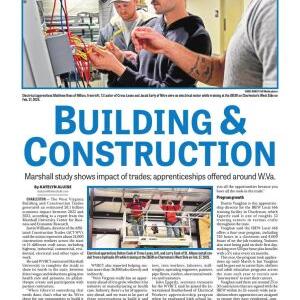At an interim legislative session meeting Sunday, a panel of West Virginia lawmakers got an update from the head of the state Office of Energy on a Morrisey administration reassessment of the state“““Į╩ėŲĄÖs economic development strategy.
But the meeting yielded more questions than answers, as the legislators reported issues with the Morrisey administration“““Į╩ėŲĄÖs pursuit of companies that could be potential sources of in-state economic development.
Addressing the Joint Government and Finance Committee at Stonewall Resort State Park in Lewis County, Office of Energy Director and Department of Commerce Deputy Secretary Nicholas Preservati said the state Department of Economic Development is finalizing a comprehensive review of economic development “““Į╩ėŲĄ£from top to bottom.“““Į╩ėŲĄØ
The Department of Economic Development is slated to operate under the Department of Commerce starting July 1, per , requested and signed into law by Gov. Patrick Morrisey. HB 2008 will rebrand the department as the Division of Economic Development under the Department of Commerce.
“““Į╩ėŲĄ£We“““Į╩ėŲĄÖve been instructed to push as fast and as hard as we can on an energy policy that incorporates our baseload generation,“““Į╩ėŲĄØ Preservati said, adding that that direction encompasses coal, gas and nuclear. “““Į╩ėŲĄ£We“““Į╩ėŲĄÖre pushing hard on that.“““Į╩ėŲĄØ
“““Į╩ėŲĄśIt“““Į╩ėŲĄÖs all about the sites“““Į╩ėŲĄÖ
Preservati said state economic development is being pursued with a focus on technology, energy and advanced manufacturing.
Preservati reported that West Virginia has received an “““Į╩ėŲĄ£overwhelming response“““Į╩ėŲĄØ from companies looking to work with utilities and establish a microgrid following state passage of , a Morrisey-requested bill aimed at easing in-state data center development in part by facilitating development of microgrids.
HB 2014 has drawn the ire of local government officials and advocates. It prohibits counties and municipalities from enforcing or adopting ordinances, rules or regulations that limit creation, development or operation of any certified microgrid district or high-impact data center project. The law eliminated a requirement that electrical service to business development districts be generated from renewable sources.
Preservati said , a federally funded research lab managed by nonprofit UT-Battelle LLC for the Department of Energy in Tennessee, is working with West Virginia officials to “““Į╩ėŲĄ£help us do our data centers.“““Į╩ėŲĄØ
Echoing what HB 2014 proponents asserted during the legislative session, Preservati said “““Į╩ėŲĄ£speed to power“““Į╩ėŲĄØ “““Į╩ėŲĄö how quick the path is to connecting to a power grid and becoming operational “““Į╩ėŲĄö is top of mind for prospective data center developers.
“““Į╩ėŲĄ£So the biggest thing that we“““Į╩ėŲĄÖve heard from them is we need to be as a state able to move with them on site readiness,“““Į╩ėŲĄØ Preservati said. “““Į╩ėŲĄ£It“““Į╩ėŲĄÖs all about the sites.“““Į╩ėŲĄØ
Preservati admits companies “““Į╩ėŲĄśbeing very frustrated“““Į╩ėŲĄÖ
Preservati reported that state officials had whittled a list of 100 priority sites down to 10 to each be allotted $75,000 site-readiness grants for economic development. He noted the state has another $50 million available that had been set aside for a forgivable loan for Cleveland-Cliffs to reopen an idled plant in Weirton to make steel for electric grid transformers before the company pulled the plug on its plan this spring.
But Preservati said he didn“““Į╩ėŲĄÖt know when he anticipated announcing the 10 sites, responding to a question from House of Delegates Finance Committee Vice Chair Clay Riley, R-Harrison.
The state needs to determine its financing priorities, what kind of investment method (such as grants or loans) it intends to use and whether to focus on emerging or more established companies, Preservati said.
Riley said he had heard from “““Į╩ėŲĄ£a couple“““Į╩ėŲĄØ of companies that they “““Į╩ėŲĄ£can“““Į╩ėŲĄÖt get answers on their investments out of the executive branch.“““Į╩ėŲĄØ
“““Į╩ėŲĄ£They“““Į╩ėŲĄÖre not getting a final decision,“““Į╩ėŲĄØ Riley said.
“““Į╩ėŲĄ£I believe there are some instances where final decisions have not been made, and I will tell you that the Governor“““Į╩ėŲĄÖs Office is well aware of that issue,“““Į╩ėŲĄØ Preservati said. “““Į╩ėŲĄ£They“““Į╩ėŲĄÖre well-aware of some of the companies being very frustrated and wanting those decisions, and we“““Į╩ėŲĄÖre working as quickly as we can to get them out.“““Į╩ėŲĄØ
Riley expressed concern in response, saying he knew of at least two companies that had “““Į╩ėŲĄ£walked away from West Virginia.“““Į╩ėŲĄØ
“““Į╩ėŲĄ£Obviously, they“““Į╩ėŲĄÖre making hundreds of millions of dollars in investments,“““Į╩ėŲĄØ Riley said. “““Į╩ėŲĄ£When they“““Į╩ėŲĄÖre trying to get a final decision, that becomes very frustrating.“““Į╩ėŲĄØ
Riley indicated banking industry sources had reported they couldn“““Į╩ėŲĄÖt get a state decision on underwriting, deterring them from filing applications.
Senate President Randy Smith, R-Preston, said West Virginia lost one business to a neighboring state because it “““Į╩ėŲĄ£couldn“““Į╩ėŲĄÖt get anybody to call back.“““Į╩ėŲĄØ
“““Į╩ėŲĄ£I“““Į╩ėŲĄÖm hoping it was just because of the transition of power,“““Į╩ėŲĄØ Smith said, alluding to the Morrisey administration“““Į╩ėŲĄÖs January takeover. “““Į╩ėŲĄ£ “““Į╩ėŲĄ” It kind of concerned me that we couldn“““Į╩ėŲĄÖt get anybody back from the Governor“““Į╩ėŲĄÖs Office to contact them.“““Į╩ėŲĄØ
“““Į╩ėŲĄ£I don“““Į╩ėŲĄÖt know anything about that,“““Į╩ėŲĄØ Preservati said, adding that he would look into the issue “““Į╩ėŲĄ£because I think we all agree we have to call people back.“““Į╩ėŲĄØ
Preservati contested an observation from House Finance Committee Chair Vernon Criss, R-Wood, that the Morrisey administration “““Į╩ėŲĄ£sounds like you“““Į╩ėŲĄÖre trying to reinvent the wheel again, because you had a change in administration.“““Į╩ėŲĄØ
“““Į╩ėŲĄ£But what we are doing is saying, the projects from the previous administration in a pipeline, are they part of a comprehensive, cohesive strategy? Do they work for West Virginia? And we“““Į╩ėŲĄÖre reviewing that,“““Į╩ėŲĄØ Preservati said.
No project has been rejected, Preservati said, adding that Department of Economic Development staff have been participating in the review.
“““Į╩ėŲĄ£But we do feel like we have to be a little more focused,“““Į╩ėŲĄØ Preservati said, “““Į╩ėŲĄ£with more of a direct strategy.“““Į╩ėŲĄØ













